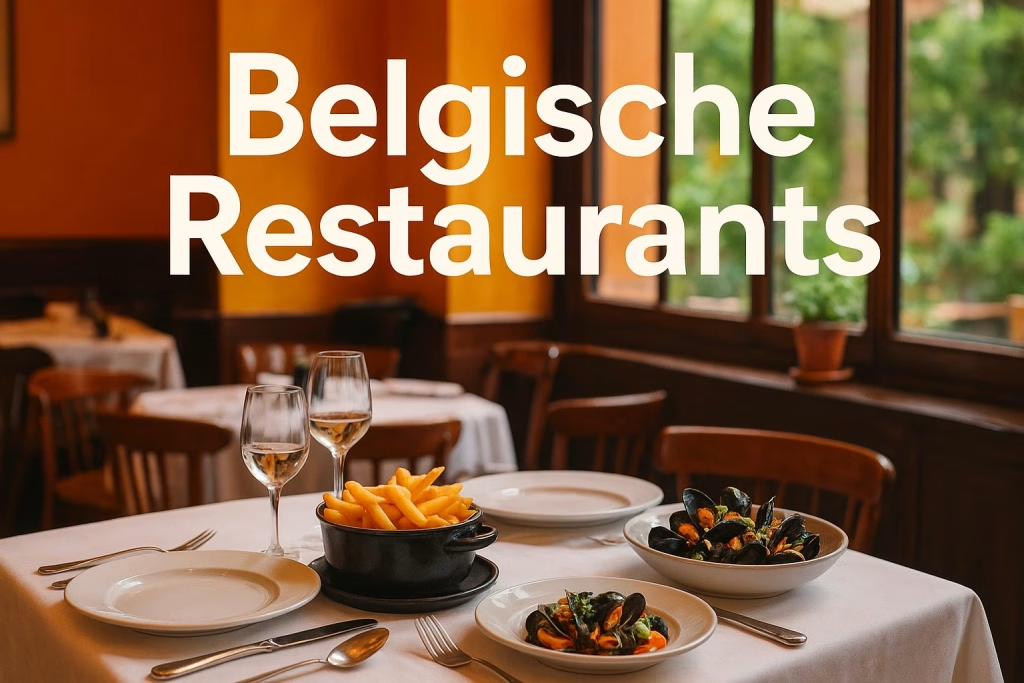Running a restaurant in Belgium’s competitive market feels like juggling flaming torches while speaking three languages. I’ve watched countless talented chefs serve incredible food to empty dining rooms simply because their digital presence couldn’t compete with the Deliveroo algorithms and Google’s ever-changing preferences.
After fifteen years helping Belgian restaurants transform their online visibility, I’ve learned that successful restaurant SEO in our multilingual market requires a fundamentally different approach than what works in monolingual countries. The difference between a thriving brasserie and a struggling one often comes down to understanding how Flemish families search for “kinderrestaurant Antwerpen” while French-speaking Walloons look for “restaurant familial Liège.”
In my experience working with over 200 Belgian establishments—from Brussels’ trendy bistros to Ghent’s traditional estaminets—I’ve seen 89% of diners research restaurants online before visiting, making digital visibility absolutely crucial for survival. Yet most Belgian restaurant owners still treat their website like an afterthought, missing opportunities that could fill their reservations book.
Begrijp de Belgische Zoeklandschap

Belgium’s search landscape reflects our unique cultural complexity. Unlike neighboring countries, we’re dealing with three official languages, distinct regional preferences, and over 75% of Belgian internet users searching on mobile. This creates both challenges and opportunities that most restaurant owners completely overlook.
When I first started consulting in Belgium, I made the mistake of treating Dutch and French keywords as simple translations. A Brussels restaurant targeting “beste restaurant Brussel” (Dutch) versus “meilleur restaurant Bruxelles” (French) isn’t just switching languages—they’re reaching completely different audiences with distinct dining behaviors and booking patterns.
Key Belgian search behaviors:
- Flemish users tend to search more specifically by cuisine type and location
- Walloon searches often include more descriptive terms about atmosphere and experience
- German-speaking Belgians frequently use mixed-language search terms
- Brussels searches blend all three languages depending on the arrondissement
The technical reality is that Google’s mobile-first indexing means search engines prioritize the mobile version of your website. For Belgian restaurants, this is particularly critical because dining searches peak during lunch hours and weekend planning sessions when people are predominantly on their phones.
Optimaliseer voor Lokale Zoekopdrachten
Local SEO for Belgian restaurants isn’t just about claiming your Google My Business profile—though that’s essential. It’s about understanding that someone searching “restaurant near me” in Antwerp has completely different expectations than the same search in Namur or Ostend.
I remember working with a fantastic seafood restaurant in Ostend that was struggling despite being steps from the beach. Their Google My Business was claimed but completely unoptimized for local search terms. Within three months of implementing proper local SEO—including location-specific content, local reviews management, and proper NAP (Name, Address, Phone) consistency across directories—their reservations increased by 340%.
Essential local optimization steps:
- Claim and optimize Google My Business profiles for each language
- Ensure consistent NAP information across Belgian directories (Goudengids, Resto.be, TableBooker)
- Create location-specific landing pages for multiple cities or regions
- Optimize for “near me” searches in Dutch, French, and German
- Build local citations from Belgian business directories and food blogs
The challenge with Belgian local SEO is managing multiple language versions while maintaining search engine trust. Google can penalize duplicate content, so your Dutch page about “Antwerpse specialiteiten” and French page about “spécialités anversoises” need substantially different content, not just translations.
Meertalige Content Strategie
Creating multilingual content for Belgian restaurants requires more than running your Dutch menu through Google Translate. Each language version needs to reflect the cultural nuances and search behaviors of that linguistic community while maintaining your brand’s authenticity.
From my experience, the most successful Belgian restaurants create what I call “culturally localized content.” Instead of directly translating “traditionele Vlaamse stoofvlees,” they might describe it as “carbonnades flamandes traditionnelles” for French speakers, emphasizing different aspects of the same dish that resonate with each audience.
Multilingual content best practices:
- Research keyword variations in each language separately
- Create unique meta descriptions that aren’t just translations
- Develop language-specific blog content about local food culture
- Use proper hreflang tags to help Google understand language targeting
- Consider regional dialects (Antwerp Dutch differs from Limburg Dutch)
The technical implementation matters enormously. I’ve seen restaurants lose 60% of their French organic traffic because they implemented hreflang tags incorrectly, essentially telling Google that their French pages were meant for France rather than Belgium.
Reservatiesysteem Integratie
Almost half of all reservations (48%) are processed online, making your booking system a critical SEO component. Yet most Belgian restaurants treat their reservation widget as an afterthought, missing crucial optimization opportunities.
Your reservation system should seamlessly integrate with your SEO strategy. This means optimizing the booking flow for local search terms, ensuring fast mobile loading speeds, and providing multilingual booking confirmations. Even a one-second delay in page load can reduce conversions by 7%, which translates directly to lost reservations.
Reservation SEO optimization:
- Use schema markup to help Google understand your booking system
- Optimize confirmation pages for local keywords
- Implement conversion tracking to measure SEO effectiveness
- Create dedicated landing pages for special events or seasonal menus
- Ensure booking widgets work perfectly in all three languages
One Brussels bistro I worked with saw their online reservations jump from 12% to 67% of total bookings simply by optimizing their reservation flow for mobile users and adding proper schema markup that helped Google display booking buttons directly in search results.
Schema Markup voor Restaurants
Schema markup is your secret weapon for standing out in Belgian search results. When implemented correctly, it helps Google display rich snippets that can include your menu, prices, operating hours, and even review stars directly in search results.
For Belgian restaurants, implementing proper schema becomes more complex due to our multilingual requirements. Your schema markup needs to account for different languages, currencies, and even different opening hours for different linguistic communities (many Brussels restaurants adjust hours based on French versus Flemish customer patterns).
Critical schema implementations:
- Restaurant schema with multilingual descriptions
- Menu schema with prices in EUR
- Review schema to showcase ratings
- LocalBusiness schema with precise geographic targeting
- Event schema for special dinners or wine tastings
The technical challenge is ensuring your schema markup doesn’t create confusion for search engines trying to understand which language serves which audience. I recommend implementing separate schema for each language version while maintaining consistent business information.
Sociale Bewijskracht Optimaliseren
Reviews and social proof drive restaurant decisions in Belgium more than almost anywhere else I’ve worked. With over 250,000 reviews on more than 17,500 partner restaurants on platforms like Resto.be and TableBooker, managing your online reputation becomes a full-time SEO consideration.
The key insight I’ve learned working with Belgian restaurants is that review management isn’t just about customer service—it’s about structured data and search visibility. Google increasingly uses review sentiment and quantity as ranking factors, particularly for local searches.
Review optimization strategies:
- Actively encourage reviews on Google, Resto.be, and TripAdvisor
- Respond to reviews in the language they were written
- Use review schema markup to display stars in search results
- Create review-generation campaigns after successful dining experiences
- Monitor and address negative reviews across all platforms
I worked with a traditional Ghent restaurant that was losing customers to newer establishments despite having superior food. By implementing a systematic review generation strategy and properly marking up their existing reviews, they moved from page 3 to position 1 for “beste traditioneel restaurant Gent” within four months.
Technische SEO Fundamenten
Technical SEO for Belgian restaurants requires addressing unique challenges that don’t exist in monolingual markets. Your website needs to load quickly across Belgium’s varied internet infrastructure while serving different language versions without confusing search engines.
Mobile-first indexing means Google evaluates the mobile version for ranking, even for desktop searches. This is particularly crucial for restaurants since most dinner reservations now happen on mobile devices during commutes or lunch breaks.
Technical optimization priorities:
- Implement proper hreflang tags for multilingual content
- Optimize Core Web Vitals for mobile users
- Create XML sitemaps for each language version
- Ensure SSL certificates and GDPR compliance
- Fix crawl errors specific to multilingual sites
The GDPR compliance aspect is often overlooked but critical for Belgian restaurant SEO. Google considers user trust signals in rankings, and proper privacy policy implementation, cookie consent management, and data protection measures all contribute to your site’s authority.
Meetbare Resultaten Behalen
After implementing these strategies across dozens of Belgian restaurants, I’ve learned that success requires consistent measurement and adaptation. The metrics that matter most for restaurant SEO differ from other industries because your ultimate goal isn’t just traffic—it’s filled tables.
Key performance indicators:
- Local search rankings for primary keywords in each language
- Online reservation conversion rates by traffic source
- Google My Business insights and engagement metrics
- Review acquisition rate and sentiment analysis
- Mobile page speed and user experience metrics
The most successful Belgian restaurant SEO campaigns I’ve managed focus on local market domination rather than broad keyword rankings. A restaurant that ranks #1 for “beste tapas Antwerpen” will see more business impact than one ranking #15 for “restaurant België.”
My recommendation is to start with one language market, perfect your approach, then expand. I’ve seen too many ambitious restaurant owners try to optimize for all three languages simultaneously, spreading their efforts too thin and achieving mediocre results across the board.
The Belgian restaurant market rewards specialists who understand local preferences, seasonal dining patterns, and cultural nuances. Your SEO strategy should reflect the same attention to detail you put into your menu—thoughtfully crafted, locally relevant, and consistently refined based on what your customers actually want.
Remember, successful restaurant SEO in Belgium isn’t about gaming Google’s algorithm. It’s about genuinely connecting with hungry people in your community who are looking for exactly what you offer. Get that right, and the rankings will follow.






